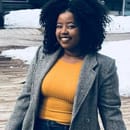As a communication student, analyzing representation in media has become nothing out of the ordinary. However, I have noticed how quick we are to always point out examples from other countries and regions like the United States and France, but how come no one ever seems to be interested in the cases in our own home? What about Canada? What about Quebec? Are we so good with representation that we do not require a conversation, or have we become so accustomed to our situation that is not worth a peep anymore? I’ve decided that if no one wanted to talk about it, I would.
When my family arrived in Quebec in 1999, they chose Montreal as their new home because of its diversity. My parents fled from their home country Burundi after the Hutu and Tutsi war ruined their country. After spending five years in a refugee camp, they were excited to start a new life in a land that would open their arms to them. The first channel my mom looked for on our modest television was TVA. To be honest, she was looking for whatever channel was screening The Bold and the Beautiful. Having been out of a job for a couple of years, she spent most of her days in front of the screen. She knew the programing by heart and never missed her beloved episodes. It helped her learn French and get accustomed to the Quebecer slang.
A couple of years later, I was old enough to watch television with her. We shared pretty much the same entertainment interests: shopping, food and drama. One night, I overheard her tell my dad that she couldn’t quite understand this place and by this place, she meant our province. She asked him “if we (people of colour) are so many living here, how come there are almost none of us on television?” My mom had no idea that she had sparked something in me that would later develop into this existential search for representation. Her question, I am sure, must have been asked by others: immigrants, minorities and even “pure laine” citizens. Why wouldn’t anyone talk about it?
In 2006, we received permanent Canadian citizenship. My parents had studied the history of Canada for months in order to pass their upcoming test. They even made us learn the anthem by heart and practice every given week. When we finally obtained our green cards, we all went to celebrate at La Stanza Buffet. We invited neighbours and family friends to join us. They were other Burundians, Congolese and Haitians awaiting their shot at upgrading their permanent resident status. In the middle of the degustation, one of my mom’s friend asked if she and my dad felt Canadian now. They answered “no.” The woman was surprised and then asked if they felt like Quebecers and they quickly responded “even less.”
When asking my best friend Juliana about her relationship to Quebec television, I was not surprised when she said she nearly had none. She said she had always preferred American television shows because they broadcasted more diversity. “There are so little people of colour in Quebec television shows that I don’t need to watch them to name them all,” she continued. I decided to analyze the program page of three different networks in Quebec to find concrete numbers. As of now in terms of regionally produced shows, according to the networks’ websites, VrakTv has three black actors for ten shows, Canal Vie has zero black hosts for 18 shows and TVA has three black actors and hosts for 40 shows. If we treat these three networks as the foundation of Quebec modern television, there are seven black celebrities participating out of 68 Quebec produced television shows*. Her issue is not only with the lack of representation, but also the way they are demanded to act when they get a slot on television. Their accent is changed as well as the expressions they use to match Quebec’s joual. When I was 12, I had an acting phase and begged my parents to take me to auditions. However, the production agency I was recruited by said I would never get roles unless I spoke more like a real Quebecer.
“There is clearly a difference between white Quebecers and immigrants or kids of immigrants, and I think it should be acknowledged and embraced instead of ignored.” Juliana said. Her comments encouraged me to ask a couple of more of my immigrant friends (or children of immigrants) to see if their experience was similar. Their answers were pretty similar: they had either chosen American television over Canadian or they had given up the Quebec culture altogether. Almost none of them identified with Quebec, even if for some, that’s where they have lived for years or even where they were born. We have all grown up watching VrakTv (a predominantly teen oriented channel) that broadcasted white Quebecer teens in schools filled with others like them that were supposed to represent our neighbours, our towns, and our region. How could they have depicted our everyday lives accurately if they couldn’t even rightfully depict our everyday environment? Was it too hard to find black actors? I could name thirty friends with whom I went to school with whose dream was to be an actor, but never got recruited for serious roles.
When I first told my mom I wanted to be a television host, she was worried for me. She tried the best way she could to discourage me from pursuing this career. She’d tell me things like “no one is going to hire you” or “you don’t have a family member that can get you in.” I grew up believing she did not think I was talented enough to make it. I tried to prove her wrong by auditioning for television gigs and did not succeed. I then tried to interview people myself – send different messages to different public figures asking them for a quick practice interview. Out of all the emails I sent, only two women answered: a retired actress and a freelance writer. I was excited to do what I loved the most. I prepared my questions, my outfit, did background research, learned about the equipment I was using and handled the location fees. However, something never felt right when interviewing these women. I could not talk the way I’d usually talk. As soon as I was in their presence, my accent shifted to a more local one- an accent that my subconscious believed they would appreciate and understand more. I was reminded of Occupation Double in 2013, and the way they used subtitles to translate Cintia’s French. Everyone in my house could understand her wording and her expressions, but the production company knew that the average Quebecer would not. The lack of people of color on television expressing themselves the way they normally would in everyday situations created a complex in me.
Today, I understand what my parents meant that evening in the buffet. Papers did not create a new identity. Having the same rights did not make us the same. I have grown to be invisible on the very platform that had the chance to make me feel welcomed. Nowadays, my mom has learned English and she enjoys American shows. She sees a future for me in the United States, but I love it here. I love this city. I love Montreal and its beautiful diversity. I believe that what hasn’t been discussed all these years can be remediated if we decide to mobilize each other and create a window of opportunity for more than seven people. So, can we talk now?
*All information was found on the networks’ official websites. The author counted the number of shows and then counted how many shows had black actors and hosts.


